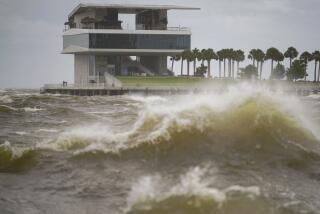Chechen Rebels Downed Craft, Russia Believes
Russian officials believe that Chechen rebels shot down a giant Russian military helicopter, killing 114 people in an attack that saw the worst battle casualties since Russia’s 1999 invasion of Chechnya.
Survivors in a hospital Tuesday described a flash and a bang near the engine and a noxious black cloud before the MI-26 helicopter crashed Monday evening outside the Chechen capital, Grozny.
Russian officials investigating the crash reportedly found a launcher for a Strela antiaircraft missile--the Russian version of a Stinger--near the scene.
Russian Prosecutor General Vladimir Ustinov, who flew from Moscow to the crash site, said the most likely cause was an attack by Chechen rebels, who earlier claimed responsibility for shooting down the chopper.
Military officials confirmed that the MI-26 was shot down by a shoulder-held Strela, according to Interfax news agency.
Ustinov said that all possible causes, including technical failure, were being investigated but that “the version of shooting of the helicopter from the ground is the main one.”
The MI-26, the world’s largest helicopter, is nicknamed the korova, or “cow,” by Russia’s military because of its bulk. It looms about 26 feet high and 110 feet long.
No other attack by Chechen rebels in the present conflict has claimed so many victims. Russian forces invaded the republic in 1999 after a 1994-96 war failed to crush separatist rebels.
On Russia’s TVS news, the anchorman solemnly read a list of the surnames of the dead, among whom were four colonels and 17 other officers, but by Tuesday night relatives still had received no official news that their loved ones had perished.
Tatyana Solovyov, mother of Yevgeny Solovyov, 20, of Moscow, had no idea that her son died. She had barely followed news of the crash because of a broken television.
He managed for two years to dodge the draft but was conscripted last December.
“Zhenya never wanted to be there,” she said, weeping. “Who will tell me--what did my son die for? My body and my soul have never been in greater pain than today.
“If they tell me he is no longer alive, that he died in that helicopter, I will go mad. I just cannot imagine that my sonny no longer breathes, that he is no longer alive, that he will never wake up to see the morning sun.”
Her son called her 10 days earlier to tell her he was about to be sent to Chechnya.
“What is the purpose of this war? It has been going on for years now, but with no progress. How many more Russian boys will get killed for nothing--for something that we do not even understand? This is a nightmare.”
The victims were conscripts, contract soldiers and officers flying to the strife-torn republic in the Caucasus for tours of duty. Thirty-three people survived the crash.
Sergei V. Borisov, 46, father of a conscript, Boris Borisov, 20, of Severomorsk in the northern Murmansk region, was angry that military officials had many times claimed that Chechnya was free of rebels.
“It is difficult for me to talk--my hands are trembling. Can you imagine finding out something like that about your son on national TV?
“Now I know what it feels like to lose a child--a feeling you cannot compare to anything.
“I have always been negative about this whole war in Chechnya.”
The presidential envoy in southern Russia, Viktor Kazantsev, strode into a hospital ward in Rostov-on-Don on Tuesday and quizzed survivors about whether they saw a flash before the crash.
“There was a flash on the right side, near the engine, then a pop and then we were covered with a kerosene cloud, a black kerosene cloud, you know, and then I lost consciousness in the fire,” replied a survivor, Sergei Shishayev, thickly bandaged on his head and arm, in an exchange aired on RTR television.
The pilot had to crash-land in a minefield, forcing a delay in rescue efforts as a sapper team cleared a path for emergency workers. The chopper’s large rear hatch jammed closed, trapping many inside the burning wreck.
The MI-26 was at 1,000 feet Monday evening, approaching to land at Russian military headquarters in Khankala near Grozny, when the pilot reported an engine fire.
Underscoring Russian vulnerability in Chechnya, the military Tuesday banned flights of the giant MI-26 in the region. It also banned future transport of personnel in the aircraft.
The Kavkaz Center Web site, which represents Chechen rebel forces, posted reports Monday and Tuesday claiming that the attack was carefully planned by a special rebel group.
Despite a heavy commitment over many years, the Russian military has not managed to grind down the rebels.
Hundreds of Russians die each year in attacks by the guerrillas, who have spurned Russian rule since the early 1990s and fought for independence since 1994.
Russian President Vladimir V. Putin declared a national day of mourning Thursday over the casualties, which surpassed the death toll of 84 paratroopers, mostly from the northwestern city of Pskov, who were killed in a bloody battle in winter 2000.
Russian Defense Minister Sergei B. Ivanov said 147 people were aboard the helicopter, including a military nurse and her child, who both died.
*
Alexei V. Kuznetsov of The Times’ Moscow Bureau contributed to this report.
More to Read
Sign up for Essential California
The most important California stories and recommendations in your inbox every morning.
You may occasionally receive promotional content from the Los Angeles Times.










